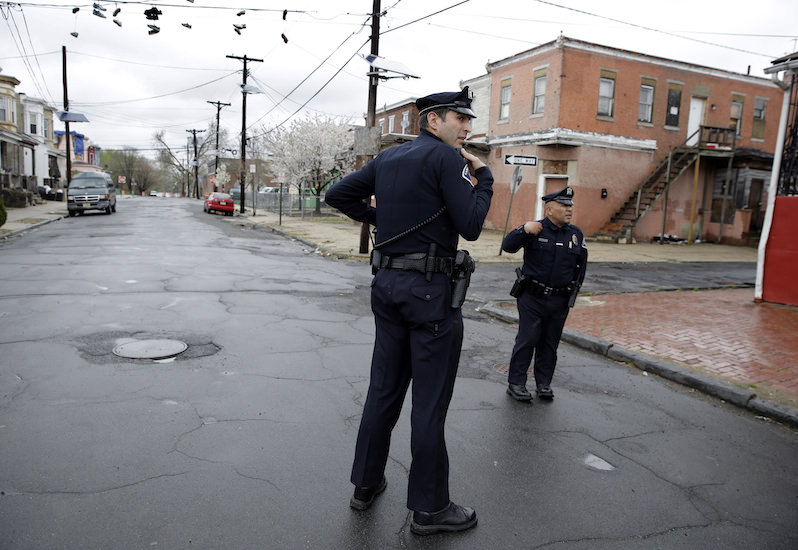New Jersey Assembly Passes Bill Requiring K-12 Students to Learn to Interact With Police
The measure, which won unanimous approval Thursday, would mandate schools to teach interacting with law enforcement "in a manner marked by mutual cooperation and respect." Camden County, N.J., police officers in 2014. Police in the state have killed eight people so far this year, according to The Washington Post. (Mel Evans / AP)
Camden County, N.J., police officers in 2014. Police in the state have killed eight people so far this year, according to The Washington Post. (Mel Evans / AP)
Camden County, N.J., police officers in 2014. Police in the state have killed eight people so far this year, according to The Washington Post. (Mel Evans / AP)
The state assembly of New Jersey passed a bill on Thursday that would require K-12 students to be taught how to interact with police officers “in a manner marked by mutual cooperation and respect.” Assembly bill A1114, which passed 76-0, would take effect in the state’s schools in 2018. The state Senate still needs to act on the measure.
When the legislation was first introduced for the 2016 session, critics said it appeared to place the onus for police interactions largely on kids — mandating only that children be taught “the role and responsibilities of a law enforcement official in providing for public safety; and an individual’s responsibilities to comply with a directive from a law enforcement official.”
An amended version of the bill now requires that schoolchildren also be taught about “an individual’s rights under law in interacting with a law enforcement official.”
In addition, it now states that the Department of Education must work with an advisory committee in order to create the curriculum. That committee includes many of the same groups that make up Newark’s Civilian Complaint Review Board, a police oversight project.
New Jersey Assemblywoman Sheila Oliver, a black woman, introduced the bill. “The number of police-related shootings around the nation have created a mistrust of police in many communities,” Oliver told NBC News. “This can help rebuild the trust that is essential for law enforcement to work.”
According to a database compiled by The Washington Post, eight people have been killed by police in New Jersey in 2017 so far, out of 461 fatal police shootings nationwide. The Post states that 12 people were killed by police in the state in 2016, and 15 in 2015.
Critics of the bill contend it empowers law enforcement over civilians.
“This legislation does not empower young people, especially those living in brown and black communities,” New Jersey-based teacher and activist Zellie Imani told NBC News. “Instead, it empowers law enforcement by allowing them to continue to evade accountability for abuse and misconduct while forcing the burden on the public.”
A 2016 report by from Washington, D.C.-based Sentencing Project found that New Jersey has the widest disparity between the incarceration rate of black men and white men.
“The Garden State puts black residents behind bars at 12 times the rate of white residents,” NJ.com summarizes, “though [the report] noted that gap is expected to shrink thanks to recent changes to New Jersey’s sentencing laws.”
The online blog Blavity also took issue with the bill: “One could argue that the example of young Tamir Rice, who was a school child with zero time to engage with the police before being gunned down or Philando Castile, a registered gun owner and law abiding citizen being killed in his car without provocation, suggests that it may not be the citizens who have an issue when engaging with the police.”
“Should we be teaching kids how to interact peacefully with police, or should we be teaching police how to interact peacefully with civilians?” the ACLU of New Jersey asked in a Facebook post. “ACLU-NJ’s Portia Allen-Kyle points out that the answer is not one or the other. The best option: offer more instruction to law enforcement officers. But in lieu of that, teaching kids about their rights is better than not preparing them at all, because when you know your rights, you’re more likely to know when those rights have been violated.”
The ACLU of New Jersey is keeping close tabs on this bill and similar pieces of legislation in the state.
“Placing the onus on individuals,” Allen-Kyle told NBC News, “whether it be students or drivers, to take responsibility for their safety during police interactions is, frankly, ridiculous.”
Your support matters…Independent journalism is under threat and overshadowed by heavily funded mainstream media.
You can help level the playing field. Become a member.
Your tax-deductible contribution keeps us digging beneath the headlines to give you thought-provoking, investigative reporting and analysis that unearths what's really happening- without compromise.
Give today to support our courageous, independent journalists.






You need to be a supporter to comment.
There are currently no responses to this article.
Be the first to respond.